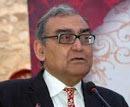 New Delhi, Mar 22: Following the upholding of the sentencing of film star Sanjay Dutt to five years imprisonment by the Supreme Court in 1993 Mumbai blasts case, Press Council of India chief Justice Markandey Katju has appealed to Maharashtra Governor K Sankarnarayanan to pardon the actor.
New Delhi, Mar 22: Following the upholding of the sentencing of film star Sanjay Dutt to five years imprisonment by the Supreme Court in 1993 Mumbai blasts case, Press Council of India chief Justice Markandey Katju has appealed to Maharashtra Governor K Sankarnarayanan to pardon the actor.In a statement issued here, Katju sought pardon for Dutt under Article 161 of the Constitution saying that he had not been found guilty of having played a role in the 1993 blasts and had suffered a lot.
Katju said the Supreme Court, having found that Sanjay Dutt had in his possession a prohibited weapon without a licence, awarded him the minimum imprisonment which was prescribed under law.
"Section 25 (1(A) of the Arms Act states that if a person has in his possession a prohibited weapon without a licence, he shall be awarded punishment of not less than 5 years imprisonment and not more than 10 years," Katju said.
He added the power of pardon under Article 161 by the Constitution is different from judicial power as the Governor or the President can grant pardon or reduce the sentence of the court even if a minimum is prescribed.
"Hence, there is no doubt that the Governor can grant pardon/reduce the sentence. For example, in the case of Commander Nanavati who was held guilty of murder, the Governor gave him pardon although the minimum sentence for murder is life sentence," Katju said.
He said the Supreme Court had not found Dutt guilty for the 1993 bomb blasts but only found him guilty of having in his possession a prohibited weapon without licence.
"Surely, this is a lesser offence than murder. When the Governor of Maharashtra granted pardon to Nanavati, surely he can grant pardon to Sanjay," Katju said.
He added though Dutt had committed an offence there are extenuating circumstances like that the event happened 20 years ago."During this period, Sanjay suffered a lot and had a cloud hovering over his head throughout.
He had to undergo various tribulations and indignities during this period. He had to go to court often, he had to take the permission of the court for foreign shootings, he could not get bank loans, etc," Katju said.
The PCI chairperson said Dutt had already undergone 18 months in jail. He added the actor had got married and they have two small children.
"He has not been held to be a terrorist and had no hand in the bomb blasts. His parents Sunil Dutt and Nargis worked for the good of society and the nation. Sunil Dutt and Nargis often went to border areas to give moral support to our brave jawans and did other social work for society," Katju said.
Katju further added that Dutt in this period of 20 years has through his films revived the memory of Mahatma Gandhi and the message of Gandhiji, the Father of the Nation, an apparent reference to "Gandhigiri" in Munnabhai films.
"In these circumstances, I respectfully appeal to your Excellency to pardon Sanjay Dutt and set him free," Katju said in his letter to the Maharashtra Governor and referred to the speech of Portia in Shakespeare’s ‘Merchant of Venice’ that justice should be tempered with mercy.





Comments
Add new comment